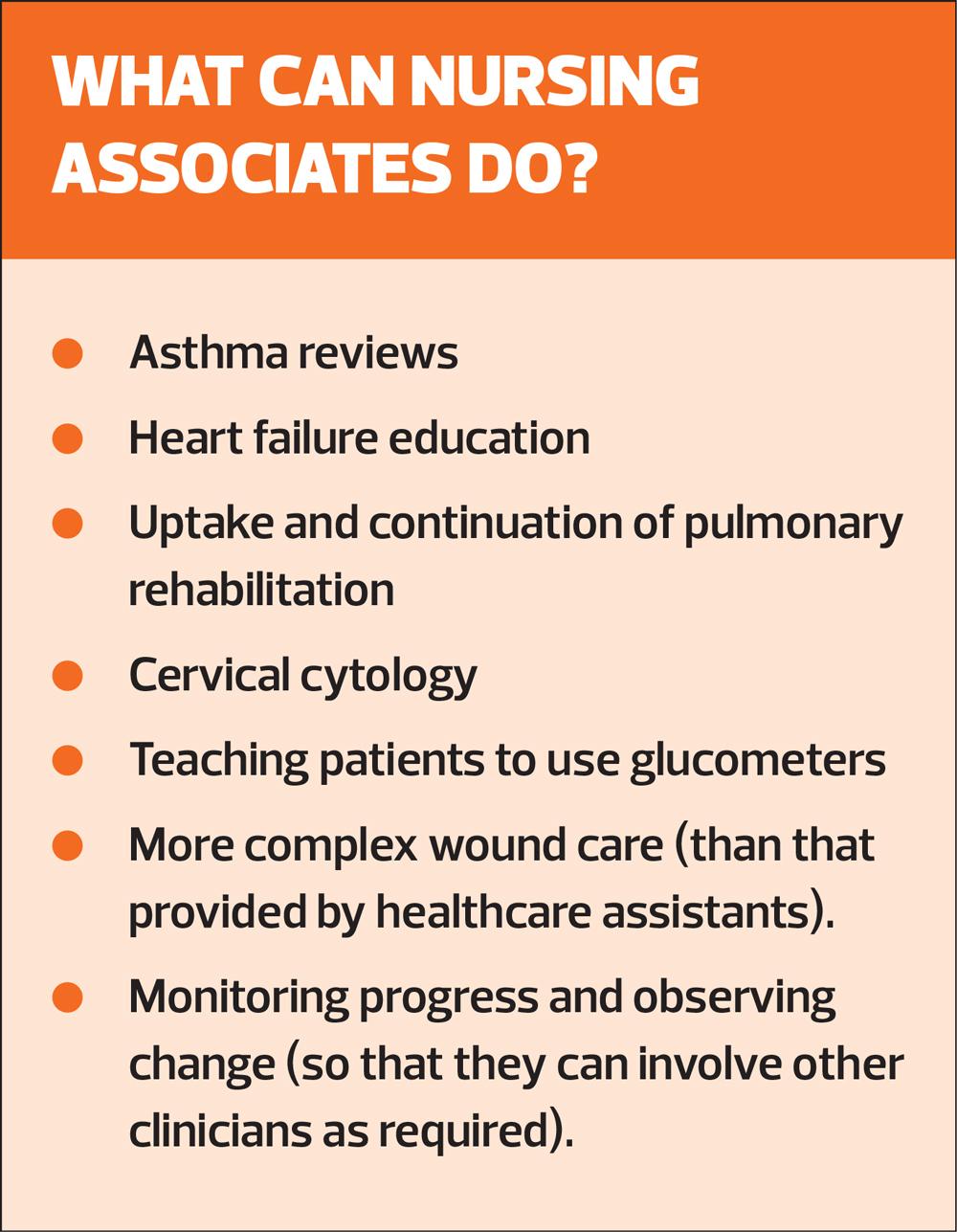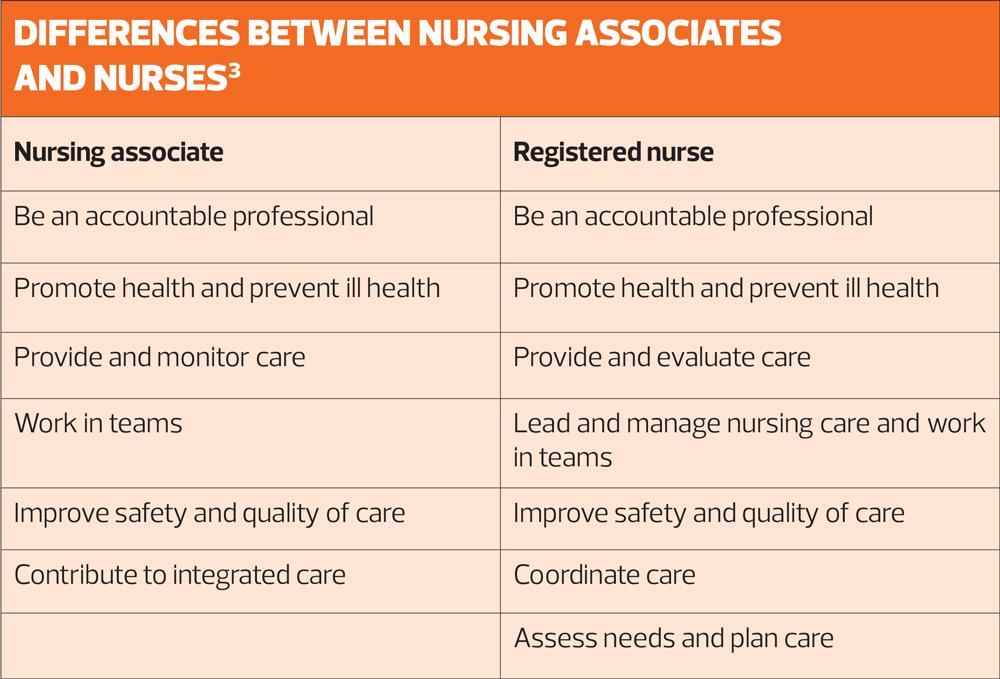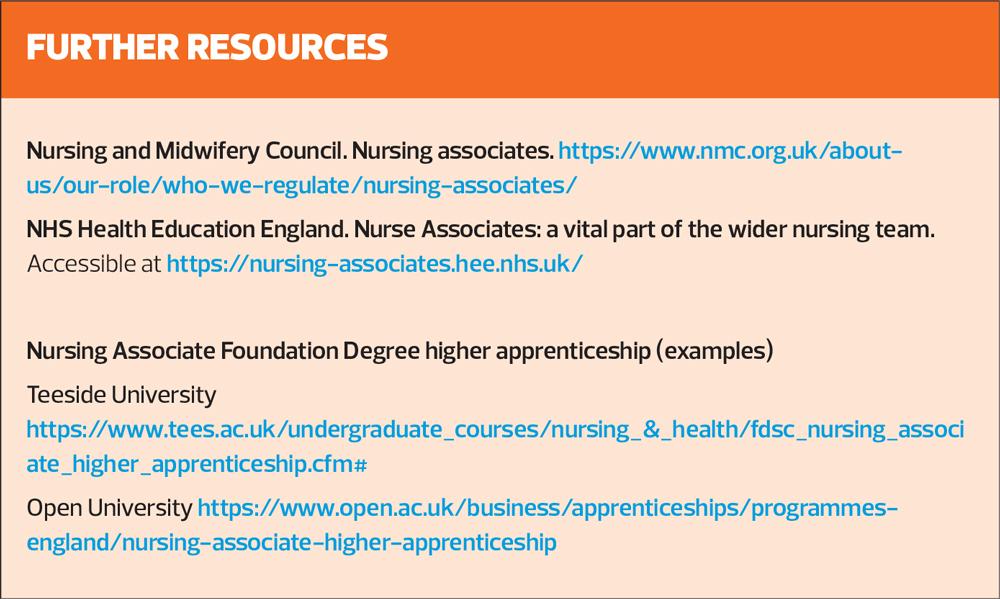
Nursing associates in general practice
Liz Bryant
Liz Bryant
MSc (Medical Education)
Advanced Nurse Practitioner
Co-contributers
Susan Beaney NA
Kate Young NA
Deborah Foster TNA
Birtley Medical Group, Gateshead, Tyne and Wear
Practice Nurse 2023;53(4):8-11
A key recommendation in the long-awaited workforce strategy for the NHS is to train 5,000 nursing associates to help address the ‘clear and pressing workforce challenges’ both in primary care and the wider NHS. But what is a nursing associate – and what role can they play in general practice?
Relative newcomers to the general practice nursing team, there are still comparatively few nursing associates (NAs) working – or setting out on their training journey – in general practice.
The role is designed to bridge the gap between graduate nurses and healthcare assistants, and to provide a route for career progression for healthcare assistants and others who wish to become a registered nurse.1
In 2017 the first pilot course for the nursing associate foundation degree was launched and in 2019 the first qualified nursing associates were registered with the Nursing and Midwifery Council (NMC).
Health Education England (HEE) envisaged that the programme would prepare Trainee Nursing Associates to work with people of all ages and in a variety of settings in health and social care.2 Therefore, some of the placements are focussed on working with people with mental health problems and learning disabilities – two groups that are increasingly accessing primary care. In whatever setting, the nursing associate delivers hands-on, person-centred care and monitors the health and well-being of the patients in their care.
The role is also seen as a step in the career progression for those who would like to train as a registered nurse.3 The foundation degree increases academic confidence in the student and helps to develop a real appetite for learning. The further study to achieve registered nurse qualification is shortened for nursing associates.
Sue West, senior nursing advisor at the NMC explained the new role when the first trained NAs were registered: ‘Nursing associates are new members of the nursing team who provide care and support to people using health and social care services across England. While nursing associates will contribute to most aspects of care, including delivery and monitoring, registered nurses will take the lead on assessment, planning and evaluation. Nurses will also lead on managing and coordinating care.'3
Nursing associates now work in a range of settings including accident and emergency, psychiatric facilities, special schools, acute wards and theatre…and of course, general practice. They can work autonomously delivering and monitoring care and responding to changing situations.
Currently, there are two newly qualified nursing associates in the author’s practice nursing team, and another trainee nursing associate who will qualify next March (2024).
Anna Knighton, Practice Manager and partner at Birtley Medical Group, said: ‘We had confidence that they were capable of the role and wanted to offer them the opportunity for progression. It is important in a small organisation to be able to offer this otherwise good staff might leave. It was a new role but I could see how it would benefit the team in terms of expanding the skill mix’.
EDUCATION ROUTES TO BECOMING A NURSING ASSOCIATE
Foundation degree
The foundation degree – which is offered by a number of universities and colleges all over the country – involves funded time for study but there will be assignments and course work that demand extra hours, and the student’s workplace does need to enable practice-based shadowing and learning as well as placement hours. There must be investment from both the clinical team and management to make this programme effective.
The Nursing Associate Higher Apprenticeship
The apprenticeship lasts 2 years whilst the student continues to be employed in practice. Theory is delivered both virtually and face-to-face depending on the university and involves weekly paid off-the-job learning. Placements in other areas of care (secondary care, mental health, paediatrics and learning disability) are organised by the university and the employer, and the employer will provide a practice assessor who will support the student through her or his training.
The practice assessor – someone from the same profession working in the practice – meets regularly with the student, ensures a rich learning experience and liaises with university for joint supervision. Practice assessor training is available for staff willing to take on this role. It may involve a day long online workshop and then mentoring from an experienced PA. There is support throughout the course for both the student and their practice assessor who will consequently become very aware of what a nursing associate can contribute.
THE NURSING ASSOCIATES’ VIEWS
Kate Young is a newly registered nursing associate at Birtley. She said: ‘I was very keen to progress in to nursing, but unfortunately my financial circumstances meant I couldn’t pursue a degree at university. I had heard about the Nursing Associate Apprenticeship through a Primary Care Network event and spoke with my clinical lead to find out more.
‘It was what I had been waiting for! The Nursing Associate Apprenticeship was a foundation degree that you could complete whilst working and was also funded, so my employer was able to gain funding from the programme. I was initially concerned that I may not meet the entry requirements with the qualification being a foundation degree, as I needed a further qualification in Maths, but the Open University who delivered my course allowed completion of any functional skills qualifications in Maths and English during the first year of the apprenticeship.
‘The interview process was straightforward and painless. If you are passionate about caring for patients and have awareness of the NMC Code of practice, it will come across in the interview.
‘The Open University has so many resources online, with helpful timelines and diary dates to help you navigate the course. You are assigned a practice assessor and a practice tutor who were incredibly supportive and helped me through some real struggles, as was the university who really do have your best interests at heart and will work hard to get you to your goal.
‘There are four modules to the course and each module has a tutor who will also support you with academic work. The first module eased me back into study, as I hadn’t worked at this level for many years. There were plenty of fellow students who hadn’t studied at this level before, but the module material gradually teaches you how to study and write academically, whilst also demonstrating ways to evaluate research that you can use in your work.
‘For me, the most challenging part of the course was attending placements. It can be trying taking yourself out of your comfort zone and working in a new environment, but the experience was invaluable and taught me resilience skills that can’t be learned through study.’
Susan Beaney, also a newly registered nursing associate at Birtley, talked about career progression and returning to study: ‘I had been an HCA for around 16 years and had been asked before to progress with my training. However, I always used the excuse of age and feeling as if I was too old to take on such a challenge. Then COVID hit and this made me question my reasons for not doing it, and I determined that life was too short, and I had nothing to lose.
‘I began my degree at 52 years old and once I had made the commitment the determination to succeed quickly became my focus and my brain began to “stretch its legs”. The tools and knowledge I have gained far outweigh any doubts I had. All through my training the teaching made me look at how I deliver advice and also expanded my knowledge of different conditions and how to apply this when I began my new role.
‘I feel more confident in my ability to give sound health advice to my patients and their families or carers. There were times when the doubts crept in and I felt I couldn’t do it, but with the support of the university, practice assessors and fellow students these doubts were quickly dispelled. I am now keen to expand on my training and continue progressing into a nursing career’.
Deborah Foster, trainee nursing associate at Birtley, said: ‘The opportunity to become a Nursing Associate was ideal for me. I had been a HCA for over 20 years and while I was never sure if I wanted to become a RGN, the NA course allowed me the chance to become registered without a cost to me. I am still able to work and earn a wage.
‘The course itself is very informative and interesting and I am learning the theory behind the day-to-day tasks that I did as a HCA. It was quite a challenge going back to learning after 20+ years of leaving education but Teeside University offer so much support, I can say it has been so helpful and made it a lot easier.’
Different NAs have different areas of interest and are now accessing further level 5 training in long term conditions such as asthma and diabetes. They are learning how to teach inhaler technique and check competency as well as monitor asthma control.
After in-house training and discussion, our trainee nursing associates set up a programme to explain to patients newly diagnosed with non-diabetic hyperglycaemia (NDH) how to look after themselves and reduce the risk of developing diabetes. The programme involved a dedicated face-to-face appointment and basic written guidance, followed by repeat HbA1c in 3 months to monitor long term blood glucose. Currently the NAs are auditing results from patients who had that input, and patients diagnosed 6 months earlier who just had a conversation with a practice nurse either by telephone or face-to-face.
A patient with newly diagnosed NDH found the programme extremely useful: ‘She [the nursing associate] explained to me that it wasn’t diabetes but my blood sugar was high and what I could do about it and helped me see how I could help myself to bring it down. She gave me something to read too.’
NEXT STEPS
Now it is action learning research. We are exploring the rich potential of our nursing associates' additional understanding and accountability in primary care, and how nursing associate skills can be used to enhance patient care and staff development. We are all partners in the research and we need regular recalibration of where we are going. At the moment we think that that the NAs will play a key role in patient education after new diagnoses of diabetes, COPD or heart failure and help them ‘own’ practical care plans. They will contribute to the annual long term condition reviews and as part of that they will teach people with asthma how to monitor their asthma control. They can be trained in cervical cytology but cannot run childhood immunisation clinics because they are not able to deliver medication under PGDs (Patient Group Directions). They still retain all the nursing skills used in the work of health care assistants but have gathered a breadth of knowledge and understanding that is already generating exciting initiatives and excellent patient education.
Anna Knighton said: ‘Employing trained nursing associates will allow for more capacity with Better Health [for long term conditions] appointments and will allow registered nurses to focus on tasks only they can do, giving us more capacity and flexibility for patients. It also provides a higher skill mix across the team giving more support to the health care assistants.’
What does that mean for these nursing associates, the nursing and practice team and, most importantly, the care delivered to over 16,000 people in this area?
CONCLUSION
The author’s overriding impression is that these three nurses, previously experienced health care assistants, bring with them their commitment to good patient care, to an efficient service and to accountability but they have developed a vibrant understanding of why they do what they do, and how to continue to build on their expertise. In other words they are now first hand promoters of evidence-based care.
Perhaps the last word should be left to Deborah, the trainee nursing associate who has six months further study before she completes her degree: ‘The challenge of working in primary care and finding placements has been an eye opener and a learning curve in resilience, but it has taught me perseverance and to challenge when it wasn't in my favour. Overall, I have enjoyed the opportunity and I would definitely encourage others to do it.’
REFERENCES
1. Royal College of Nursing. Becoming a nursing associate; 2019. https://www.rcn.org.uk/Professional-Development/Nursing-Support-Workers/Become-a-nursing-associate
2. Health Education England Nursing Associate: a new support role in patient care. https://www.hee.nhs.uk/our-work/nursing-associates
3. Nursing & Midwifery Council. Role differences between nursing associates and nurses; 13 March 2019. https://www.nmc.org.uk/news/news-and-updates/blog-whats-a-nursing-associate/
Related articles
View all Articles


